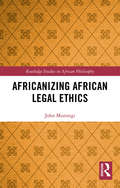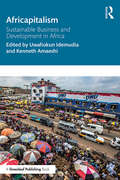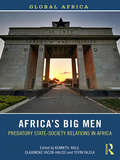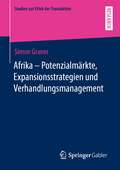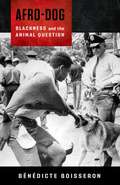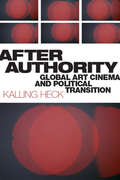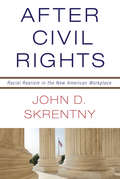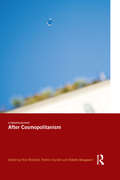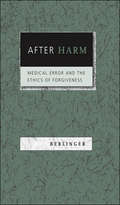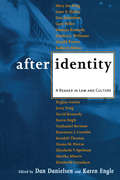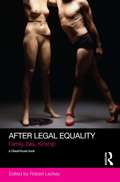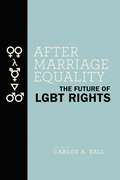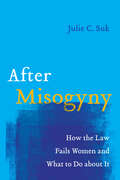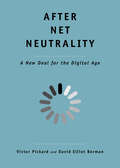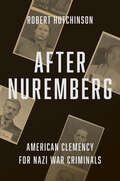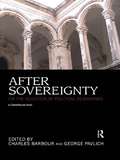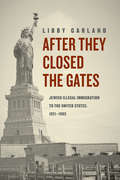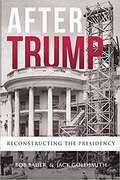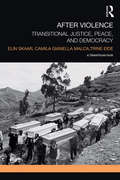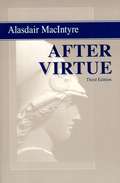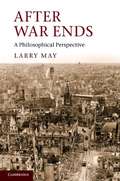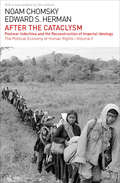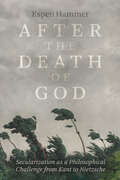- Table View
- List View
Africanizing African Legal Ethics (Routledge Studies in African Philosophy)
by John MurungiThis book is a philosophical inquiry into indigenous African legal ethics, asking what is African about African legal ethics? Taking us beyond a geographical understanding of Africa, the author argues for an African legal ethics that is distinct from non-African African legal ethics which are rooted in Euro-Western constructions. De-silencing African voices on African legal ethics this book decolonizes the prevailing wisdom on legal ethics and broadens our understanding of how law in Africa bears on ethics in Africa or, conversely, on how ethics bears on law in Africa. This book will be of interest to scholars of African philosophy, philosophy of law, and legal ethics.
Africapitalism: Sustainable Business and Development in Africa
by Kenneth Amaeshi Uwafiokun IdemudiaUsing theory, empirical research, and case studies, this book explores the changing nature of business in Africa and how businesses can actively contribute to the development of Africa. It uses (and critically analyses) the concept of Africapitalism – a management philosophy and movement which seeks to blend the best of African values and Western management theories as a basis for sustainable development in Africa – to understand the subtle factors that underpin business decisions in Africa. The collection of chapters in this book are organized around actors, issues, and reflections. They collectively present an account of Africapitalism, albeit from different perspectives and on different issues, and open up a new space for rethinking business and society relations in Africa from an Africapitalism perspective. Crucial is the critical engagement with both the discourse and practice of Africapitalism and its implications for sustainable development. It is anticipated that the challenges and opportunities highlighted by the book would be embraced by researchers, policy makers, and practitioners in the broad area of business and society in Africa. This multidisciplinary book will be valuable reading for advanced students, researchers and policymakers looking at business in society; corporate social responsibility; sustainable business; international business and African development.
Africa’s Big Men: Predatory State-Society Relations in Africa (Global Africa)
by Toyin Falola Kenneth Kalu Olajumoke Yacob-HalisoThis book spotlights, analyzes and explains varying forms and patterns of state-society relations on the African continent, taking as point of departure the complexities created by the emergence, proliferation and complicated interactions of so-called ‘big men’ across Africa's fifty-four states. The contributors interrogate the evolution of Africa’s big men; the role of the big men in Africa’s political and economic development; and the relationship between the state, the big men and the citizens. Throughout the chapters the contributors engage with a number of questions from?different disciplinary and methodological orientations. How did these states evolve to exhibit various deformities in their composition, functioning and in their relations with the societies that they govern? What roles did Atlantic and other slavery and European colonialism play in creating states that are unable to display the right and good relationships with citizens in civil society? Why did these forms of predatory state-society relations continue to thrive in Africa after the end of Atlantic slave trade and subsequent colonialism? Why did the emerging African leaders at independence fail to effectively dismantle the structures of exploitation and expropriation that were the defining features of slavery and colonialism? Who are Africa’s ‘big men’, and what are their trajectories? This book is essential reading for all students and scholars of African politics, public policy and administration, political economy, and democratisation.
Afrika - Potenzialmärkte, Expansionsstrategien und Verhandlungsmanagement (Studien zur Ethik der Transaktion)
by Simon GranerDiese Dissertation befasst sich mit dem Thema einer Expansion nach Afrika und beleuchtet alle polydimensionalen Transaktionen, die hinsichtlich der Auswahl möglicher afrikanischer Potenzialmärkte, adäquater Expansionsstrategien und lokalem Verhandlungsmanagement notwendig sind.Die Forschungsfragen, die diesbezüglich beantwortet werden, sind: Welches sind die afrikanischen Länder, mit denen es sich aktuell und in Zukunft lohnt Geschäfte zu machen? Mit welchen Strategien kann ein expansionswilliges Unternehmen aus Deutschland oder Europa auf den afrikanischen Kontinent expandieren und in Afrika weiter wachsen? Wie sollen Geschäfte in den Expansionsländern eingefädelt und abgewickelt werden, um nachhaltigen Geschäftserfolg in Afrika zu erzielen? Welche kulturellen und ethischen Aspekte sind notwendig?Durch praktische Werkzeuge, die die theoretischen Ausarbeitungen abrunden, verliert diese Dissertation nie an Aktualität und kann auch in Zukunft branchen- und unternehmensindividuell genutzt werden.
Afro-Dog: Blackness and the Animal Question
by Bénédicte BoisseronThe animal-rights organization PETA asked “Are Animals the New Slaves?” in a controversial 2005 fundraising campaign; that same year, after the Humane Society rescued pets in the aftermath of Hurricane Katrina while black residents were neglected, some declared that white America cares more about pets than black people. These are but two recent examples of a centuries-long history in which black life has been pitted against animal life. Does comparing human and animal suffering trivialize black pain, or might the intersections of racialization and animalization shed light on interlinked forms of oppression?In Afro-Dog, Bénédicte Boisseron investigates the relationship between race and the animal in the history and culture of the Americas and the black Atlantic, exposing a hegemonic system that compulsively links and opposes blackness and animality to measure the value of life. She analyzes the association between black civil disobedience and canine repression, a history that spans the era of slavery through the use of police dogs against protesters during the civil rights movement of the 1960s to today in places like Ferguson, Missouri. She also traces the lineage of blackness and the animal in Caribbean literature and struggles over minorities’ right to pet ownership alongside nuanced readings of Derrida and other French theorists. Drawing on recent debates on black lives and animal welfare, Afro-Dog reframes the fast-growing interest in human–animal relationships by positioning blackness as a focus of animal inquiry, opening new possibilities for animal studies and black studies to think side by side.
After Authority: Global Art Cinema and Political Transition
by Kalling HeckAfter Authority explores the tendency in art cinema to respond to political transition by turning to ambiguity, a system that ideally stems the reemergence of authoritarian logics in art and elsewhere. By comparing films from Italy, Hungary, South Korea, and the United States, this book contends that the aesthetic tradition of ambiguity in art cinema can be traced to post-authoritarian conditions and that it is in the context of a transition away from authoritarianism where art cinema aesthetics become legible. Art cinema, then, can be seen as a mode of cinematic practice that is at its core political, as its constitutive ambiguity finds its roots in the rejection of centralized and hierarchical configurations of authority. Ultimately, After Authority proposes a history of art cinema predicated on the potentials, possibilities, and politics of ambiguity.
After Civil Rights: Racial Realism in the New American Workplace
by John D. SkrentnyA provocative new approach to race in the workplaceWhat role should racial difference play in the American workplace? As a nation, we rely on civil rights law to address this question, and the monumental Civil Rights Act of 1964 seemingly answered it: race must not be a factor in workplace decisions. In After Civil Rights, John Skrentny contends that after decades of mass immigration, many employers, Democratic and Republican political leaders, and advocates have adopted a new strategy to manage race and work. Race is now relevant not only in negative cases of discrimination, but in more positive ways as well. In today's workplace, employers routinely practice "racial realism," where they view race as real—as a job qualification. Many believe employee racial differences, and sometimes immigrant status, correspond to unique abilities or evoke desirable reactions from clients or citizens. They also see racial diversity as a way to increase workplace dynamism. The problem is that when employers see race as useful for organizational effectiveness, they are often in violation of civil rights law.After Civil Rights examines this emerging strategy in a wide range of employment situations, including the low-skilled sector, professional and white-collar jobs, and entertainment and media. In this important book, Skrentny urges us to acknowledge the racial realism already occurring, and lays out a series of reforms that, if enacted, would bring the law and lived experience more in line, yet still remain respectful of the need to protect the civil rights of all workers.
After Cosmopolitanism
by Rosi Braidotti Bolette Blaagaard Patrick HanafinAt a time when social and political reality seems to move away from the practice of cosmopolitanism, whilst being in serious need of a new international framework to regulate global interaction, what are the new definitions and practices of cosmopolitanism? Including contributions from leading figures across the humanities and social sciences, After Cosmopolitanism takes up this question as its central challenge. Its core argument is the idea that our globalised condition forms the heart of contemporary cosmopolitan claims, which do not refer to a transcendental ideal, but are rather immanent to the material conditions of global interdependence. But to what extent do emerging definitions of cosmopolitanism contribute to new representative democratic models of governance? The present volume argues that a radical transformation of cosmopolitanism is already ongoing and that more effort is needed to take stock of transformations which are both necessary and possible. To this end, After Cosmopolitanism calls for an understanding of cosmopolitanism that is more attentive to the material reality of our social and political situation and less focused on linguistic analyses of its metaphorical implications. It is the call for a cosmopolitanism that is also a cosmopolitics.
After Greenwashing
by Frances BowenBusinesses promote their environmental awareness through green buildings, eco-labels, sustainability reports, industry pledges and clean technologies. When are these symbols wasteful corporate spin, and when do they signal authentic environmental improvements? Based on twenty years of research, three rich case studies, a strong theoretical model and a range of practical applications, this book provides the first systematic analysis of the drivers and consequences of symbolic corporate environmentalism. It addresses the indirect cost of companies' symbolic actions and develops a new concept of the 'social energy penalty' - the cost to society when powerful corporate actors limit the social conversation on environmental problems and their solutions. This thoughtful book develops a set of tools for researchers, regulators and managers to separate useful environmental information from empty corporate spin, and will appeal to researchers and students of corporate responsibility, corporate environmental strategy and sustainable business, as well as environmental practitioners.
After Harm: Medical Error and the Ethics of Forgiveness
by Nancy BerlingerMedical error is a leading problem of health care in the United States. Each year, more patients die as a result of medical mistakes than are killed by motor vehicle accidents, breast cancer, or AIDS. While most government and regulatory efforts are directed toward reducing and preventing errors, the actions that should follow the injury or death of a patient are still hotly debated. According to Nancy Berlinger, conversations on patient safety are missing several important components: religious voices, traditions, and models. In After Harm, Berlinger draws on sources in theology, ethics, religion, and culture to create a practical and comprehensive approach to addressing the needs of patients, families, and clinicians affected by medical error. She emphasizes the importance of acknowledging fallibility, telling the truth, confronting feelings of guilt and shame, and providing just compensation. After Harm adds important human dimensions to an issue that has profound consequences for patients and health care providers.
After Identity: A Reader in Law and Culture
by Karen Engle Dan DanielsenAuthored by the leading voices in critical legal studies, feminist legal theory, critical race theory and queer legal theory, After Identity explores the importance of sexual, national and other identities in people's lived experiences while simultaneously challenging the limits of legal strategies focused on traditional identity groups. These new ways of thinking about cultural identity have implications for strategies for legal reform, as well as for progressive thinking generally about theory, culture and politics.
After Legal Equality: Family, Sex, Kinship (Social Justice)
by Robert LeckeyGroups seeking legal equality often take a victory as the end of the line. Once judgment is granted or a law is passed, coalitions disband and life goes on in a new state of equality. Policy makers too may assume that a troublesome file is now closed. This collection arises from the urgent sense that law reforms driven by equality call for fresh lines of inquiry. In unintended ways, reforms may harm their intended beneficiaries. They may also worsen the disadvantage of other groups. Committed to tackling these important issues beyond the boundaries that often confine legal scholarship, this book pursues an interdisciplinary consideration of efforts to advance equality, as it explores the developments, challenges, and consequences that arise from law reforms aiming to deliver equality in the areas of sexuality, kinship, and family relations. With an international array of contributors, After Legal Equality: Family, Sex, Kinship will be an invaluable resource for those with interests in this area.
After Marriage Equality: The Future of LGBT Rights
by Carlos A. BallExamines the impact of marriage equality on the future of LGBT rightsIn persuading the Supreme Court that same-sex couples have a constitutional right to marry, the LGBT rights movement has achieved its most important objective of the last few decades. Throughout its history, the marriage equality movement has been criticized by those who believe marriage rights were a conservative cause overshadowing a host of more important issues. Now that nationwide marriage equality is a reality, everyone who cares about LGBT rights must grapple with how best to promote the interests of sexual and gender identity minorities in a society that permits same-sex couples to marry. This book brings together 12 original essays by leading scholars of law, politics, and society to address the most important question facing the LGBT movement today: What does marriage equality mean for the future of LGBT rights?After Marriage Equality explores crucial and wide-ranging social, political, and legal issues confronting the LGBT movement, including the impact of marriage equality on political activism and mobilization, antidiscrimination laws, transgender rights, LGBT elders, parenting laws and policies, religious liberty, sexual autonomy, and gender and race differences. The book also looks at how LGBT movements in other nations have responded to the recognition of same-sex marriages, and what we might emulate or adjust in our own advocacy. Aiming to spark discussion and further debate regarding the challenges and possibilities of the LGBT movement’s future, After Marriage Equality will be of interest to anyone who cares about the future of sexual equality.
After Misogyny: How the Law Fails Women and What to Do about It
by Julie C. SukA rigorous analysis of systemic misogyny in the law and a thoughtful exploration of the tools needed to transcend it through constitutional change beyond litigation in the courts. Just as racism is embedded in the legal system, so is misogyny—even after the law proclaims gender equality and criminally punishes violence against women. In After Misogyny, Julie C. Suk shows that misogyny lies not in animus but in the overempowerment of men and the overentitlement of society to women's unpaid labor and undervalued contributions. This is a book about misogyny without misogynists. From antidiscrimination law to abortion bans, the law fails women by keeping society's dependence on women's sacrifices invisible. Via a tour of constitutional change around the world, After Misogyny shows how to remake constitutional democracy. Women across the globe are going beyond the antidiscrimination paradigm of American legal feminism and fundamentally resetting baseline norms and entitlements. That process, what Suk calls a "constitutionalism of care," builds the public infrastructure that women's reproductive work has long made possible for free.
After Nature: A Politics for the Anthropocene
by Jedediah PurdyNature no longer exists apart from humanity. The world we will inhabit is the one we have made. Geologists call this epoch the Anthropocene, Age of Humans. The facts of the Anthropocene are scientific--emissions, pollens, extinctions--but its shape and meaning are questions for politics. Jedediah Purdy develops a politics for this post-natural world.
After Net Neutrality: A New Deal for the Digital Age (The Future Series)
by Victor Pickard David Elliot BermanA provocative analysis of net neutrality and a call to democratize online communication This short book is both a primer that explains the history and politics of net neutrality and an argument for a more equitable framework for regulating access to the internet. Pickard and Berman argue that we should not see internet service as a commodity but as a public good necessary for sustaining democratic society in the twenty-first century. They aim to reframe the threat to net neutrality as more than a conflict between digital leviathans like Google and internet service providers like Comcast but as part of a much wider project to commercialize the public sphere and undermine the free speech essential for democracy. Readers will come away with a better understanding of the key concepts underpinning the net neutrality battle and rallying points for future action to democratize online communication.
After Nuremberg: American Clemency for Nazi War Criminals
by Robert HutchinsonHow the American High Commissioner for Germany set in motion a process that resulted in every non-death-row-inmate walking free after the Nuremberg trialsAfter Nuremberg is about the fleeting nature of American punishment for German war criminals convicted at the twelve Nuremberg trials of 1946–1949. Because of repeated American grants of clemency and parole, ninety-seven of the 142 Germans convicted at the Nuremberg trials, many of them major offenders, regained their freedom years, sometimes decades, ahead of schedule. High-ranking Nazi plunderers, kidnappers, slave laborers, and mass murderers all walked free by 1958. High Commissioner for Occupied Germany John J. McCloy and his successors articulated a vision of impartial American justice as inspiring and legitimizing their actions, as they concluded that German war criminals were entitled to all the remedies American laws offered to better their conditions and reduce their sentences. Based on extensive archival research (including newly declassified material), this book explains how American policy makers&’ best intentions resulted in a series of decisions from 1949–1958 that produced a self-perpetuating bureaucracy of clemency and parole that &“rehabilitated&” unrepentant German abettors and perpetrators of theft, slavery, and murder while lending salience to the most reactionary elements in West German political discourse.
After Sovereignty: On the Question of Political Beginnings
by Charles Barbour George PavlichAfter Sovereignty addresses the vexed question of sovereignty in contemporary social, political, and legal theory. The emergence, and now apparent implosion, of international capital exceeding the borders of known political entities, the continued expansion of a potentially endless 'War on Terror', the often predicted, but still uncertain, establishment of either a new international American Empire or a new era of International Law, the proliferation of social and political struggles among stateless refugees, migrant workers, and partial citizens, the resurgence of religion as a dominant source of political identification among people all over the globe – these developments and others have thrown into crisis the modern concept of sovereignty, and the notions of statehood and citizenship that rest upon it. Drawing on classical sources and more contemporary speculations, and developing a range of arguments concerning the possibility of political beginnings in the current moment, the papers collected in After Sovereignty contribute to a renewed interest in the problem of sovereignty in theoretical and political debate. They also provide a multitude of resources for the urgent, if necessarily fractured and diffuse, effort to reconfigure sovereignty today. Whilst it has regularly been suggested that the sovereignty of the nation-state is in crisis, the exact reasons for, and exact implications of, this crisis have rarely been so intensively examined.
After They Closed the Gates: Jewish Illegal Immigration to the United States, 1921-1965
by Libby GarlandIn 1921 and 1924, the United States passed laws to sharply reduce the influx of immigrants into the country. By allocating only small quotas to the nations of southern and eastern Europe, and banning almost all immigration from Asia, the new laws were supposed to stem the tide of foreigners considered especially inferior and dangerous. However, immigrants continued to come, sailing into the port of New York with fake passports, or from Cuba to Florida, hidden in the holds of boats loaded with contraband liquor. Jews, one of the main targets of the quota laws, figured prominently in the new international underworld of illegal immigration. However, they ultimately managed to escape permanent association with the identity of the OC illegal alienOCO in a way that other groups, such as Mexicans, thus far, have not. Ina"After They Closed the Gates, a"Libby Garland tells the untold stories of the Jewish migrants and smugglers involved in that underworld, showing how such stories contributed to growing national anxieties about illegal immigration. Garland also helps us understand how Jews were linked to, and then unlinked from, the specter of illegal immigration. By tracing this complex history, Garland offers compelling insights into the contingent nature of citizenship, belonging, and Americanness. "
After Trump: Reconstructing The Presidency
by Jack Goldsmith Bob BauerIn After Trump: Reconstructing the Presidency, Bob Bauer and Jack Goldsmith provide a comprehensive roadmap for reform of the presidency in the post-Trump era.In fourteen chapters they offer more than fifty concrete proposals concerning presidential conflicts of interest, foreign influence on elections, pardon power abuse, assaults on the press, law enforcement independence, Special Counsel procedures, FBI investigations of presidents and presidential campaigns, the role of the White House Counsel, war powers, control of nuclear weapons, executive branch vacancies, domestic emergency powers, how one administration should examine possible crimes by the president of a prior administration, and more. <P><P>Each set of reform proposals is preceded by rich descriptions of relevant presidential history, and relevant background law and norms, that place the proposed reforms in context. All of the proposals are prefaced by a chapter that explains how Trump--and, in some cases, his predecessors--conducted the presidency in ways that justify these reforms.After Trump will thus be essential reading for the coming debate on how to reconstruct the laws and norms that constitute and govern the world’s most powerful office.It’s hard to imagine two better co-authors for the task. Both served in senior executive branch positions—in the administrations of Barack Obama and George W. Bush, respectively—and have written widely on the presidency.Bob Bauer served from 2010-2011 as White House Counsel to President Barack Obama, who in 2013 named Bauer to be Co-Chair of the Presidential Commission on Election Administration. He is a Professor of Practice and Distinguished Scholar in Residence at New York University School of Law, as well as the co-director of its Legislative and Regulatory Process Clinic.Jack Goldsmith served as Assistant Attorney General, Office of Legal Counsel from 2003-2004, and Special Counsel to the Department of Defense from 2002-2003. He is the Learned Hand Professor at Harvard Law School, co-founder of Lawfare, and a Senior Fellow at the Hoover Institution. Together, in this book, they set the terms for the national discussion to come about the presidency, its powers, and its limits.
After Violence: Transitional Justice, Peace, and Democracy
by Elin Skaar Camila Gianella Malca Trine EideAfter Violence: Transitional Justice, Peace, and Democracy examines the effects of transitional justice on the development of peace and democracy. Anticipated contributions of transitional justice mechanisms are commonly stated in universal terms, with little regard for historically specific contexts. Yet a truth commission, for example, will not have the same function in a society torn by long-term civil war or genocide as in a society emerging from authoritarian repression. Addressing trials, reparations, truth commissions, and amnesties, the book systematically addresses the experiences of four very different contemporary transitional justice cases: post-authoritarian Uruguay and Peru and post-conflict Rwanda and Angola. Its analysis demonstrates that context is a crucial determinant of the impact of transitional justice processes, and identifies specific contextual obstacles and limitations to these processes. The book will be of much interest to scholars in the fields of transitional justice and peacebuilding, as well as students generally concerned with human rights and democratisation.
After Virtue: A Study in Moral Theory (3rd edition)
by Alasdair MacintyreIn this classic work, Alasdair MacIntyre examines the historical and conceptual roots of the idea of virtue, diagnoses the reasons for its absence in personal and public life, and offers a tentative proposal for its recovery.
After War Ends
by Larry MayThere is extensive discussion in current Just War literature about the normative principles which should govern the initiation of war (jus ad bellum) and also the conduct of war (jus in bello), but this is the first book to treat the important and difficult issue of justice after the end of war. Larry May examines the normative principles which should govern post-war practices such as reparations, restitution, reconciliation, retribution, rebuilding, proportionality and the Responsibility to Protect. He discusses the emerging international law literature on transitional justice and the problem of moving from a position of war and possible mass atrocity to a position of peace and reconciliation. He questions the Just War tradition, arguing that contingent pacifism is most in keeping with normative principles after war ends. His discussion is richly illustrated with contemporary examples and will be of interest to students of political and legal philosophy, law and military studies.
After the Cataclysm: Postwar Indochina and the Reconstruction of Imperial Ideology (The Political Economy of Human Rights #2)
by Noam Chomsky Edward S. HermanVolume two of the influential study of US foreign policy during the Cold War—and the media&’s manipulative coverage—by the authors of Manufacturing Consent. First published in 1979, Noam Chomsky and Edward Herman&’s two-volume work, The Political Economy of Human Rights, is a devastating analysis of the United States government&’s suppression of human rights and support of authoritarianism in Asia, Africa and Latin America during the 1960s and 70s. Still one of the most comprehensive studies of the subject, it demonstrates how government obscured its role in torture, murder and totalitarianism abroad with the aid of the news media. In the first volume, Chomsky and Herman focus on US terror in Indochina. In volume two, After the Cataclysm, the authors examine the immediate aftermath of those actions, with special focus on the Khmer Rouge takeover of Cambodia. Throughout, the authors track the media response to the US interventions—a mixture of willful silence and Orwellian misrepresentation.
After the Death of God: Secularization as a Philosophical Challenge from Kant to Nietzsche
by Espen HammerA fresh history of nineteenth-century philosophy’s many ideas about secularization. The secularization thesis, which held that religious belief would gradually yield to rationality, has been thoroughly debunked. What, then, can we learn from philosophers for whom the death of God seemed so imminent? In this book, Espen Hammer offers a sweeping analysis of secularization in nineteenth-century German philosophy, arguing that the persistence of religion (rather than its absence) animated this tradition. Hammer shows that Kant, Hegel, Feuerbach, Marx, and Nietzsche, each in their own way, sought to preserve and transform religion’s ethical and communal aspirations for modern life. A renewed appreciation for this tradition’s generous thought, Hammer argues, can help us chart a path through needlessly destructive conflicts between secularists and fundamentalists today.
